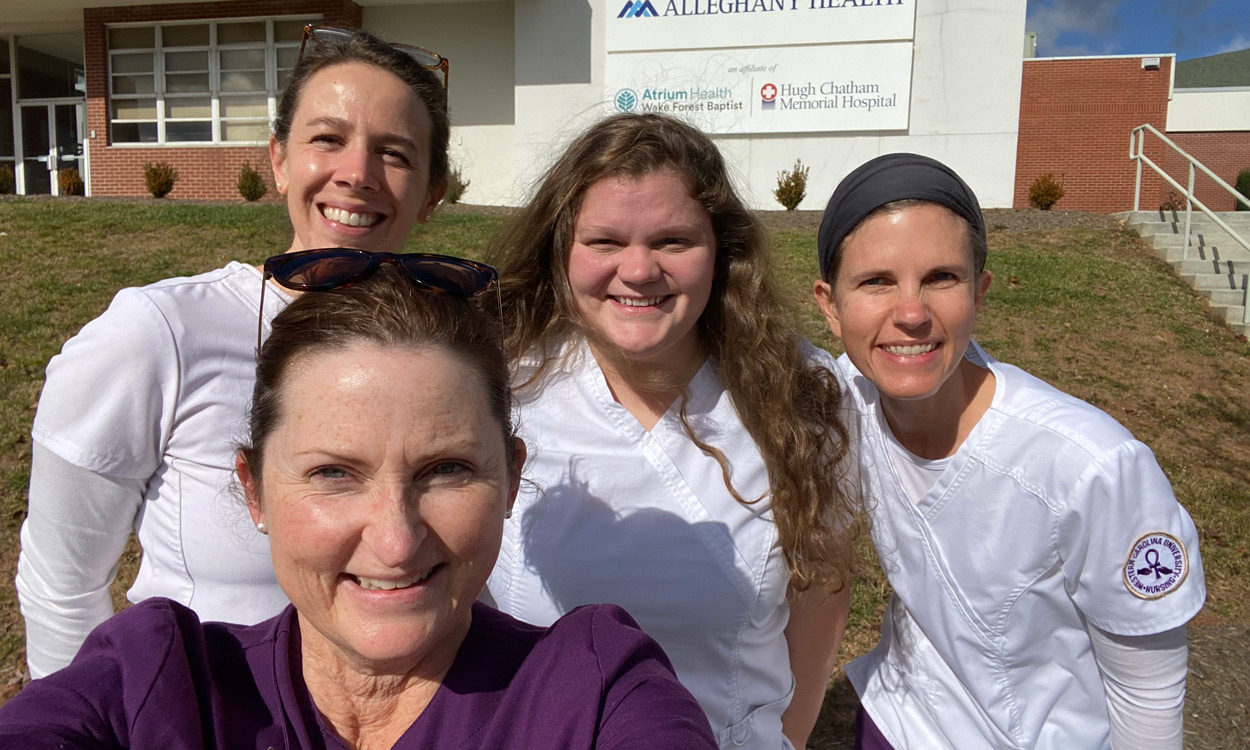Food and Faith Changed Lives of WCU Siblings
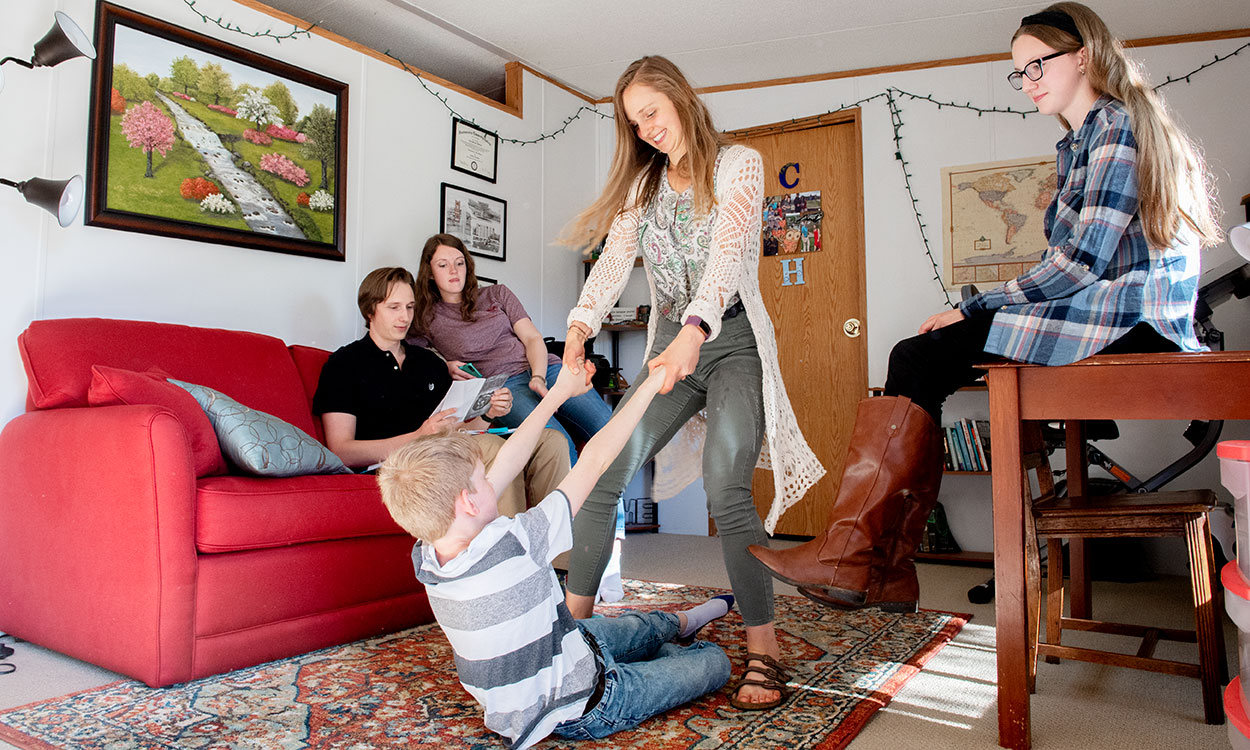
Rachel Sullivan, center, plays with her half brother, while her half sister, right, looks on. Rachel’s brother, Caleb Sullivan, and his wife, Hannah Sullivan, left, go over the family’s daily schedule.
Rachel Sullivan believes in the power of good food on the body and of the Holy Spirit on the soul. Without one, she would not have found the other — or her life’s calling.
Sullivan is a 20-year-old Western Carolina University junior and Honors College student majoring in nutrition and dietetics, an area of study she chose after witnessing the effects of starvation on her two half siblings whose parents were dealing with substance abuse issues. Sullivan and her half siblings, now age 9 and 13, have the same birth mother.
“They were pale, skinny, bags under their eyes,” Sullivan said. “It was November 2016. I was a freshman at Western. I worked at a fast food place and my mom would bring the kids by at 12 o’clock at night. Most of the time they would sleep in the car or they wouldn’t go home at all. They weren’t going to school, they weren’t being fed. My half sister said that one time she ate a whole stick of butter because she was so hungry, and my half brother had to eat packets of sauces because they were absolutely starving.”
Sullivan, who now shares legal custody of the children with her brother Caleb, 21, a senior at WCU who will graduate in May, said she realized then that if she didn’t do something to save her half siblings, “something bad” was going to happen. Rachel knew bad, as did Caleb, because of their own dysfunctional childhoods. But Rachel knew something else: as a new Christian, she had an unshakeable faith in God and a bone-deep desire to succeed in life, despite her own traumatic upbringing.
Rachel and Caleb Sullivan grew up ‘free range’ as teenagers in Sylva because of their father’s work schedule. As soon as they got home from school, he left for work, not returning until midnight when Rachel and Caleb were asleep. Their parents had divorced shortly after Rachel was born and their mother was in and out of their lives. She was often abusive and emotionally unstable because of her abuse of alcohol and drugs, the siblings said, and eventually lost custody of them after a drug arrest.
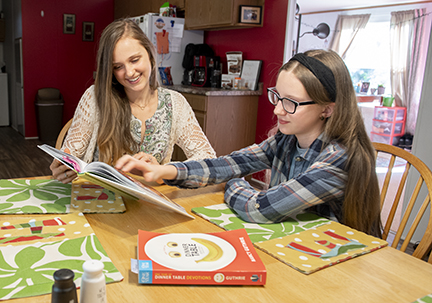
Rachel Sullivan, left, helps her 13-year-old half sister with her homework at the family’s kitchen table.
“Caleb and I never sat down for a family dinner,” Rachel said. “We never had any type of normal functioning. There was no structure. I grew up not understanding what marriage was like, not understanding what relationships were like, not understanding what brings me value, purpose or identity.”
Their mother eventually remarried, and she and her new husband had a child — Rachel’s and Caleb’s half sister. The couple stayed clean, Caleb said, until his mother had a second child — a boy—and the substance abuse returned.
“I was in high school and I would hear from different people in the community that mom was tweaking out in bathrooms at my half sister’s school plays,” he said. “I didn’t know what to do about it. I kept confronting her and she kept lying to me saying she wasn’t doing those things. But then I got confirmation from one of my close friends that she was. I quit going to her house to see her and the kids all together because I was just really mad. But Rachel kept going to take care of the kids.”
Rachel and Caleb struggled to survive the emotional chaos that had come to dictate their lives, a chaos driven by feelings of abandonment and neglect. “We raised ourselves,” said Rachel. “I just did whatever I wanted, and that was not best for me. I drowned my problems with bad boyfriends, drugs, smoking weed and drinking to numb all of the pain I was feeling from not having any structure in my life at all.”
Remarkably, despite their chaotic home lives and virtual lack of adult supervision, the Sullivans focused on going to college. In middle school, Caleb had been tagged as a New Century Scholar (as has his half sister), a program that provides college preparation skills and financial support to students with potential. After high school, he enrolled at Southwestern Community College in Sylva, graduating with an associate degree in May 2017. “I decided I was going to make the most of my time at Southwestern,” he said. “I worked my butt off.” He then enrolled at WCU, where he will graduate with a degree in communication with a concentration in public relations in May.
Meanwhile, Rachel was working in Sylva, living with her dad and preparing for her freshman year at WCU. She had participated in SCC’s dual enrollment program, earning college credits while simultaneously finishing her senior year of high school.
“Despite all of my flaws, I maintained good grades throughout high school,” she said. “I knew that if I wanted to make anything out of my life it had to be through education and it had to be my own doing because I had no support in my family. I could not depend on my parents, I could not depend on anybody. If I wanted success out of this life, it had to be something I was willing to do, and nothing was going to stop me. I was not going to follow the same path as my parents.”
The summer of 2016 proved to be a turning point. “One night I came home from work and I had really been struggling with alcoholism, drugs, everything,” she said. “My dad invited me to church and I was like, ‘no offense to you dad, but I think your god is really exclusive and mean and I don’t want to be a part of that.’”
He persisted in urging her to go and she continued pushing back, eventually bad-mouthing him to the point he grounded her and took away her phone. “I said, ‘Dad, even if I wanted to go to church tomorrow I couldn’t because you took my phone and that has my alarm clock.’”
But something had resonated with Rachel and she challenged God that night to reveal himself to her. “I was like, ‘Lord, if you are real, wake me up tomorrow and get me ready for church.’”
The next morning she awoke right on time. “And that day I went to church,” she said. “I don’t remember what the sermon was about. I don’t remember the details. I just remember feeling in my soul that this was what I needed, this was who I needed to be, and I have no desire to turn back.”
Five months later, strengthened by her new faith, Rachel had a plan. She and Caleb would take their half siblings over Christmas break while their mother entered rehab, as she had promised. The children would return to their mother once school started in January if she was clean.
Their mother never entered rehab and disappeared. The younger children’s father was not in their lives because of the effect his sustained substance abuse had on him, said Rachel and Caleb.
“There’s a certain kind of disbelief that comes along when your parents fail you enough,” Caleb said. “It’s like, ‘Wow, really? You’re really lying to me for the 23rd or 24th time?’ Then after a while you’re just not shocked anymore and it’s just ‘whatever.’”
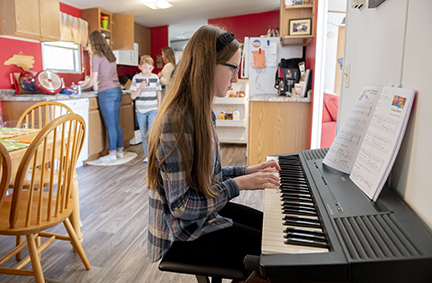
Rachel and Caleb Sullivan’s 13-year-old half sibling practices her piano.
In January 2017, after their mother’s disappearance, the four siblings fell into a new routine in a tiny two-bedroom apartment with a galley kitchen not large enough for a table. With little financial help from anyone, Caleb and Rachel adjusted their school schedules to fit their new life with their young siblings. Rachel eventually quit her job to be home with the children after school and in the summer. Caleb supported the four of them working on weekends while going to school during the week. “We didn’t have two nickels to rub together,” he said. “That’s still kind of how it’s going now until I get a job in my field.”
But that was when Rachel saw the wonder of nutrition on a previously starved body and another that had been abused and out of shape — her own.
“When the kids moved in, I knew that they were in desperate need of good nutrition and food in general,” Rachel said. “The kids were pale, skinny and weak. So, when they moved in I knew that I needed to prepare them healthful meals. I started preparing them a variety of fruits and vegetables. Through feeding them more healthfully, I started to adopt the same patterns of eating. Once the weight started coming off and I felt so much better physically, spiritually and emotionally, I then knew this was my calling in life. I came upon the profound realization that food was so much more than a means to fill our stomachs, it was medicine. I changed my major to nutrition with hopes of showing others what lifestyle medicine can do.”
Once her half siblings started eating properly, they began to flourish, Rachel said. “They started running, playing and actually laughing. Of course, nutrition was not the only reason, but I certainly believe it was the foundation of their transformation.”
Another transformation had taken place as well. Thanks to Rachel’s patience and guidance, Caleb had undergone his own spiritual reckoning, which led him to his now-wife, Hannah Sullivan, 23, a 2018 graduate of WCU and a Jackson County school teacher. Her presence has brought a welcome calm to the Sullivans’ lives. “I’ve always wanted to be married and a family man and I couldn’t have done this without her help or without knowing that she is there,” Caleb said.
The couple married in June 2018, a union that put Hannah’s parents in a new and unexpected role: grandparents-in-training. “They help out anyway they can,” Hannah said. “And the kids are so awesome. They love my parents.”
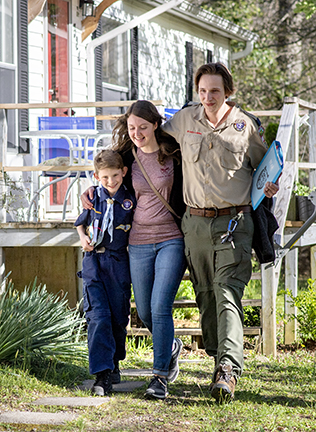
Caleb and Hannah Sullivan serve as troop leaders for Caleb’s 9-year-old half brother’s Boy Scout troop.
Rachel and Caleb were granted emergency custody of their half siblings in October 2017 and full custody in May 2018. All five currently live together in a four-bedroom house owned by Rachel’s and Caleb’s maternal grandmother. The house, said Rachel, was an answer to her prayer and the start of their new normal. Hannah and Caleb serve as Caleb’s half brother’s Boy Scout leaders and they provide his half sister with piano lessons.
“Everybody has their own room and we have a kitchen table, something I specifically prayed for,” Rachel said. “Our kitchen table is a place where we play games together, we eat together and we talk about each other’s days and we have devotions together.”
In a couple of months, Caleb and Hannah will move into a house of their own across the street from where they live now. They hope to start a family of their own, which they see as an expansion of their current one. “We’ll be able to have good family time,” Hannah said. “We’ll share a lot of meals, a lot of game nights, stuff like that.”
All three young adults believe their situation was meant to be, echoing each other’s perspective that the initial adversity has given way to clarity and purpose.
“My goal before becoming a parent was to make a lot of money and to be successful,” Caleb said. “Now my goals are to be the best parent I can be, to have a steady job with good hours so I can be there for the kids every day. My goal now is to make a difference in my community, but starting at home.”
“I literally knew — being an only child — that my life was meant to be something more than it was,” Hannah said. “I knew God wanted me to make an impact in a family’s life, or somebody’s life. First, I met Caleb and learned about his struggles, and then I found out that it was a whole family affair. So, I knew this is where I needed to be.”
For Rachel, she holds tight to her faith despite worrying about balancing her studies with attentive parenting, paying for school and eventually graduate school and soon being the sole adult in the house with the children.
“God is faithful,” she said. “Caleb and Hannah will be right down the street, so it will work out.”
Meanwhile, she will continue her new mission: teaching her half siblings (and others, eventually) about the power of love through food and faith — her go-to ingredients for a healthy life.
“Allowing my half siblings to participate in the cooking process gives them a sense of responsibility for the meal and they are more likely to appreciate and enjoy the foods they help make,” Rachel said. “And, by allowing them to participate, they learn new skills, which helps build their self-esteem and gives them a sense of accomplishment. Our dinner table is certainly a sacred space in our family and by far the greatest blessing the Lord has given us.”
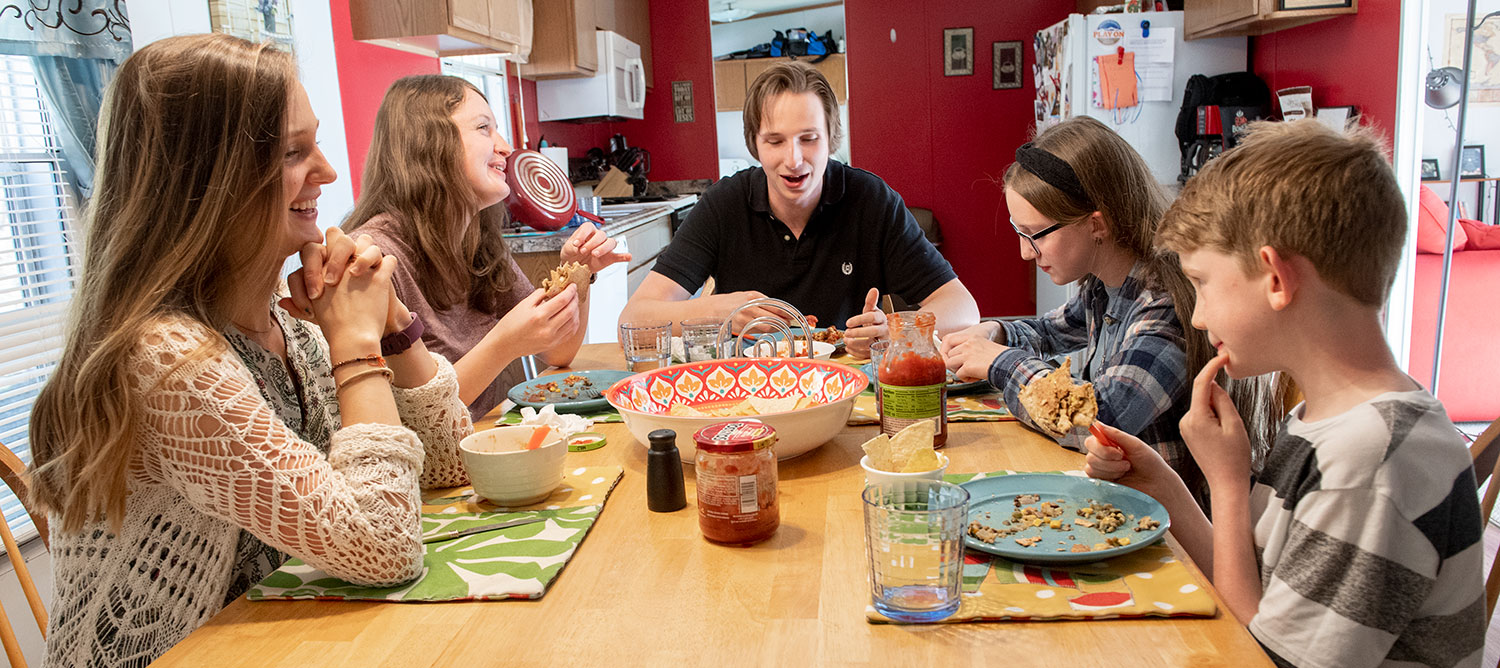
The family uses meal time as a way to strengthen their spiritual and family bonds.
By Melanie Threlkeld McConnell

